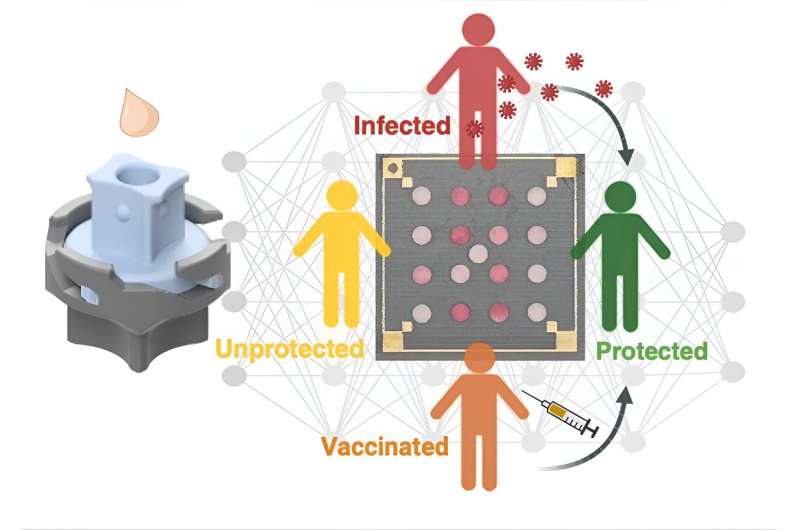This article has been reviewed according to Science X's editorial process and policies. Editors have highlighted the following attributes while ensuring the content's credibility:
fact-checked
peer-reviewed publication
trusted source
proofread
Researchers develop portable serological test for rapid COVID-19 immunity monitoring

A team of researchers from the University of California, Los Angeles (UCLA) has developed a new paper-based serological test that can rapidly and accurately monitor changes in immunity against SARS-CoV-2, the virus responsible for COVID-19. This innovative technology promises to revolutionize how we assess and track immunity in individuals, providing critical data to inform public health decisions.
The study, led by Professors Aydogan Ozcan and Dino Di Carlo, presents a paper-based multiplexed vertical flow assay (xVFA) that detects levels of IgG and IgM antibodies against five structural proteins of SARS-CoV-2. The test uses only a small volume of serum and delivers results in under 20 minutes, offering a significant advancement over existing methods.
The study is published in the journal ACS Nano.
Key innovations and benefits
- Rapid and accurate testing: The xVFA platform can assess immunity status with an accuracy of 89.5%. This is achieved by detecting specific antibody responses using a mobile phone-based reader and a neural network-based serodiagnostic algorithm.
- Cost-effective and portable: Unlike traditional serological assays that require expensive and bulky equipment, the xVFA is both affordable and portable. This makes it ideal for point-of-care use, especially in resource-limited settings where quick and reliable testing is crucial.
- Multiplexed detection: The test simultaneously measures IgG and IgM antibodies against multiple SARS-CoV-2 proteins, providing a comprehensive profile of an individual's immunity. This capability is essential for distinguishing between antibodies generated by vaccination and those from past infections.
How it works
The xVFA is a paper-based platform that incorporates several layers to create a vertical flow network, enabling capillary action to transport the serum sample through different testing regions. The assay panel contains 17 spots, including duplicates of the five SARS-CoV-2 proteins and control spots.
Upon applying a serum sample, the test detects the presence of antibodies that bind to these proteins. A custom-designed mobile phone-based optical reader captures images of the paper-based sensor, and the collected data are processed by a deep learning algorithm to classify the immunity status of the individual into one of three categories: protected, unprotected, or infected.
Implications for public health
The development of this rapid and reliable serological test has significant implications for public health:
- Timely vaccination decisions: By providing real-time data on immunity levels, the xVFA can help determine the need for booster vaccinations, ensuring timely administration to maintain adequate immunity in the population.
- Surveillance and epidemiology: The ability to quickly assess immunity levels across large populations can enhance monitoring efforts and inform strategies to combat future outbreaks.
- Accessibility in resource-poor areas: The affordability and portability of the xVFA make it an excellent tool for use in remote or underserved regions, improving global access to critical immunity monitoring.
Future directions
The UCLA team is committed to further enhancing the capabilities of the xVFA. Future research will focus on expanding the test to include other pathogens and adapting the platform for use with different types of vaccines.
The team also plans to refine the machine learning algorithm to improve accuracy and extend the technology's applications to broader public health monitoring needs.
More information: Merve Eryilmaz et al, A Paper-Based Multiplexed Serological Test to Monitor Immunity against SARS-COV-2 Using Machine Learning, ACS Nano (2024). DOI: 10.1021/acsnano.4c02434

















